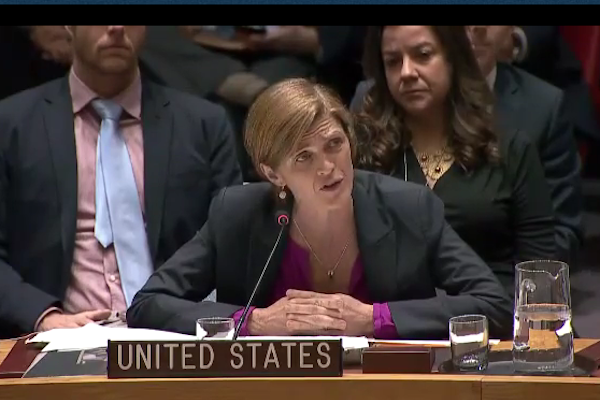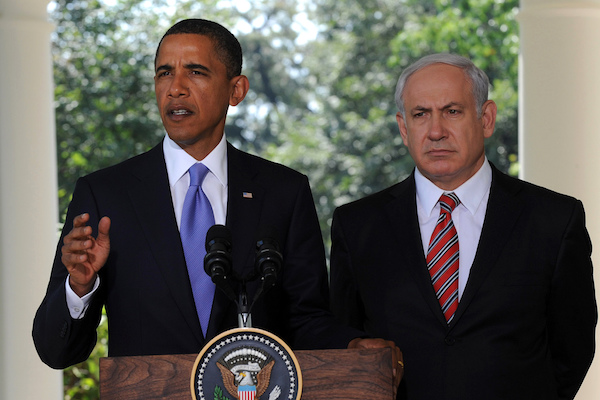Everyone knew that abstention from the Security Council’s anti-settlement resolution was one of the more realistic options on a very limited menu. So why is the Left now up in arms?

U.S. Ambassador to the United Nations Samantha Power barely got the word “abstain” out of her mouth before the liberal left ripped into the decision with a thousand knives. Wait, what? The U.S. abstention allowed the Security Council to pass Resolution 2334 by 14-0. The statement calls on Israel to halt to settlement activity, viewed as a mortal threat to the two-state solution, the signature policy of the left in this conflict (and the center too). Both the United Nations Security Council and the U.S. swore their undying loyalty to ending the conflict through two states; anyone who supports this was supposed to celebrate.
But the more cynical than thou left had to find counterpoint criticism, well, just because. In response, I will summon the apt Hebrew phrase: Hevre, ma kara? You get what you want but it’s still not good enough?
For months, every specialized left-wing policy circuit has been rife with speculation — even obsession — with hope that Obama would do at least something on this issue on his way out. Everyone knew that abstention from an anti-settlement resolution was one of the more realistic options on a very limited menu. I never heard a single liberal left-winger argue against it.
Then overnight, with cyber-columns to fill, complaints sprung to life in the form of a few essentially flimsy arguments.
One is that for eight years, Obama was unable to prevent the expanding, multi-headed hydra of occupation or preserve the vanishing two-state solution. The abstention allowing the UNSC to pass a single resolution against settlements is too little too late — a mocking reminder that the outgoing president’s talk was bigger than his walk. This is the gist of Aluf Benn’s column in Haaretz. Apparently some critics would prefer that Obama to slink out of the room in shame rather than drive home a lasting statement. I can already recite the “biting” critique of these same people upbraiding Obama in an alternate universe for failing to take one final stance.

Another acrobatic analysis holds that the abstention will further embolden the right-wing argument, in which the whole world is against Israel. That’s a ringing endorsement of never doing anything. If a $38 billion aid package couldn’t buy a defensive shield against a single critical move by the Obama administration, nothing can. The fanatic Right spits out “anti-Israel” like an automatic pitcher against everything from ISIS to the IDF, whenever someone steps out of the Netanyahu line. No serious person should succumb to this cheap conflation. When the UN made a mistake, as I believe UNESCO did with relation to the Temple Mount/Haram al Sharif resolution, it should be called out. When the policy is correct – such as the UN Security Council members affirming their longtime opposition to settlements, which is also coincidentally U.S. policy, it should be supported, period.
Perhaps the most legitimate critique is that the resolution itself may be meaningless. No UN statement has ever stopped Israel’s juggernaut of an occupation; the Israeli government itself can barely budge a motley handful of caravans from a freezing, muddy hill in the West Bank.
This is a genuine question. Do rhetorical, declarative, or symbolic moves have any role left when the physical situation is crumbling and people’s lives are at stake? Did the U.S. just expend precious political capital on an empty declaration that won’t change a whit on the ground?
Though it may seem arbitrary, I believe that declarative politics still matter; especially one with so many layers of meaning. Here’s why:
First, the decision was a groundbreaking departure from one of the many deadlocked doors blocking any change of policy in this region: the infamous U.S. veto that defanged any UNSC pressure on Israel, often before the teeth could even be bared. No more — if Israel so desperately wants occupation via settlements, it is more on its own than ever.
Second, the decision is a smart slap down of Trump’s intervention, when the latter asked Obama to please veto the resolution, as if he had any idea what all this means. Trump now looks ridiculous, left in the dust, writing flaccid fist-shaking tweets that when he is president “things will be different.”
As to the U.N., things will be different after Jan. 20th.
— Donald J. Trump (@realDonaldTrump) December 23, 2016
Third, Obama has flat-out rejected the illusion that Israel’s democracy inside the Green Line inoculates it from criticism against occupation. Netanyahu and his henchman can cry “only democracy in the Middle East” all they want (and Israel is still relatively democratic inside the Green Line, despite recent erosion and original flaws). But stakeholders are sick of the fiction that Green Line Israel is somehow separate from the settlements; that the West Bank, Gaza, or the four million Palestinian inhabitants Israel rules without rights or representation is somehow unrelated to Israel. The U.S. is tired of having its intelligence, or its eyesight, questioned.
The U.S. abstention and the resolution lays bare the Israeli government’s profound contradiction: Israel doesn’t get to settle the West Bank in the name of all of Israel, then cry that criticism of settlements is a de facto attack on all of Israel. Israel doesn’t get to rule Palestinians through a violent regime under martial law for 50 years, then point to Green Line democracy as proof that the settlements are legitimate. And most of all, Israel does not get to disconnect settlements from occupation: to date, settlements have played the role of “yated ne’eman”– the firm stake – pinning Israel’s army to the West Bank in perpetuity. Settlements alone are not the occupation, but they are at present its biggest symbol.
So if Israel is angry about a symbolic measure against settlements, there is only one way out: take physical steps to end the occupation.


